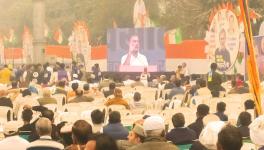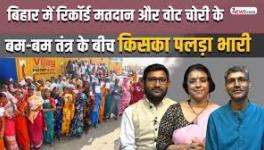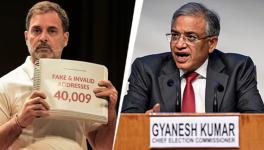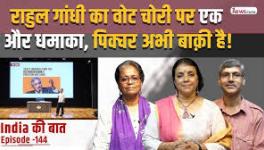Has Time Finally Run Out for the Congress Party?
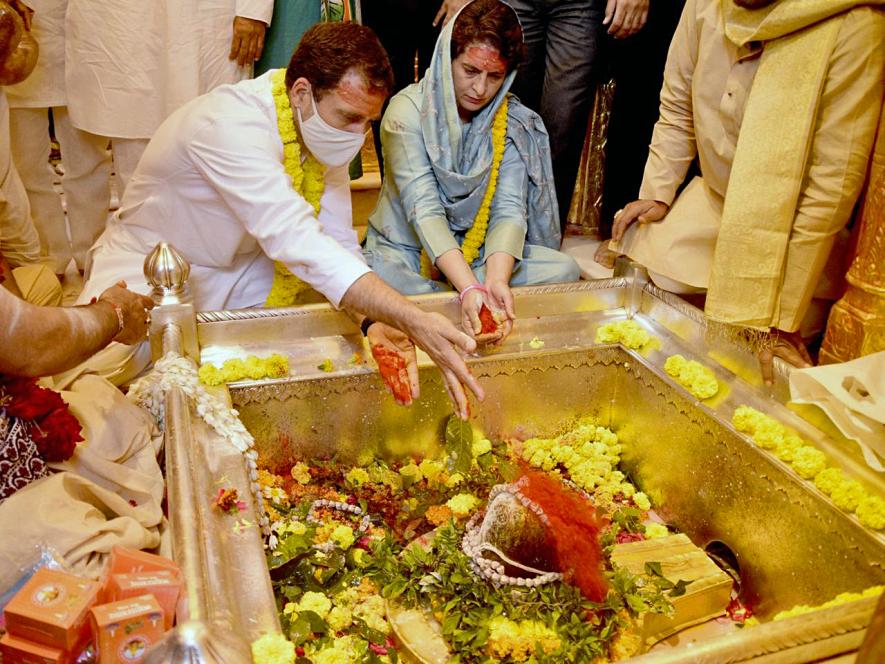
Rahul Gandhi and Priyanka Gandhi offering prayers at Kashi Vishwanath Temple
In its early months, 2022 has brought us weighty evidence about the imminent demise of the Congress, India’s so-called Grand Old Party, with more humiliation being heaped upon it at the hustings. So, where can India’s ‘other’ pan-India party go from here? Not very far, it certainly seems.
Even a few months ago, when the various governments led by the Bharatiya Janata Party (BJP) seemed to be beset by a multitude of problems in the run-up to a year of important elections, none more than those in Uttar Pradesh, those who wished for a vigorous opposition force in the country were still hopeful that the Congress would get itself together, willy-nilly, to play a positive role in the unfolding of politics.
Now, it appears that the Congress does not have the courage, commitment and energy to shake itself out of its torpor and pull itself up by its bootstraps. It seems most unfortunately that it has just been ejected from its last-chance saloon.
A quick look at the numbers and basic story must be our starting point. Nobody expected the Congress to put in a stellar performance in Uttar Pradesh, but there were expectations that it would make some kind of an incremental improvement, given the host of issues available to the opposition to use against both the state and central governments. What did happen, however, is that between 2017 and 2022 its vote share fell from 6.2 to 2.3% and the number of seats it won was reduced from seven to two.
You could say that the Uttar Pradesh story does not prove anything major so far as the Congress is concerned; slim pickings just got slimmer. From that perspective, the Punjab story is the most salient, because the Congress was wiped out from a state it was holding. In 2017, it had won 38.5% of the vote to bring in 77 seats out the 117 in the assembly; in 2022, its vote share was down to 23% and it got just 18 seats. To make matters worse, it was wiped out by the Aam Aadmi Party (AAP), formed just eight years ago, which got 92 seats and 42% of the vote.
In two other states, Goa and Uttarakhand, the Congress was supposed to either return to power, or, at least, make a decent bid for it. In the former state, it didn’t do too badly, almost holding on to its vote share to get 11 seats in the fractured oppositional space of a small state with an assembly consisting of 40 seats. But the big point is that the BJP was also allowed to retain its vote share and get to the half-way mark.
Uttarakhand was the shocker, however. In a state in which it was widely perceived to be on the ropes, the BJP got 47 seats in a 70-strong Assembly, down 10 from 2017, while all the Congress could do was increase its number of seats from 11 to 19. In terms of voting percentages, the BJP lost less than 2%, while the Congress gained 4.5.
In Manipur, the Congress was supposed to go under. It obliged, losing more than half its vote share and being reduced to a bit player with five seats in a 60-strong Assembly.
Over this year and the next, the Congress faces crucial challenges in Karnataka and Gujarat, and Chhattisgarh and Rajasthan. In its currently enfeebled state, it will have its work cut out for it everywhere. Why have matters come to such a sorry pass?
The problem stems from the top—the leadership, with the Gandhis at the centre of it. Let us begin by noting that the decline of the Congress can be charted from roughly the time Sonia Gandhi started attenuating her role to create greater space for Rahul Gandhi. Contrasting the career of the two would be instructive.
Sonia was initially reluctant to get into politics after Rajiv Gandhi’s death. She was ultimately persuaded, but only after several years. It would not be absurd to assume that she took over the party leadership only after she had satisfied herself that politics was what she was going to do. One may assume that in the intervening years, she observed, studied and learnt. Which is why she did a thorough and successful job, taking many absolutely critical decisions.
On the contrary, Rahul seemed somehow to have strolled into the leadership of the party without much thought about whether that was what he really wanted and what the whole business entailed. Which is why his greatest drawback as a politician, it is now glaringly obvious, is a lack of commitment and propensity to make himself scarce when the chips are down.
Some say that Sonia’s success was not so much because of her own capacities, rather, she talked to the right people and listened to good advice. That is, in fact, what good leadership is all about. Again, Rahul suffers in comparison. His approach to leadership appears peremptory, while he is also reportedly inaccessible to party leaders. He works through a small group of people. Clearly, the advice they are tendering to him is not politically accurate.
For evidence of criminal incompetence, look at the way matters relating to the Bihar elections were handled in 2021. And this year, as if it had learnt absolutely nothing, it made a big mess of its handling of Punjab affairs. It was quite clear that Rahul was in charge but not really on top of things.
There is the obvious point, of course, that the Gandhis alone could not have brought the party to where it is now. The sedulously cultivated culture of sycophancy that pervades the party and listlessness at all levels are bigger phenomena.
For instance, when in August 2020 a group of senior leaders got together to write a letter urging serious organizational reforms and a settling of the leadership question, they were strafed by Rahul himself and members of his inner circle as traitors and saboteurs. The substantive and legitimate concerns of the so-called group of 23 or G-23 were never seriously addressed.
Now, Ghulam Nabi Azad, a G-23 member, has gone on record to express shock and grief, as well he might. There is the likelihood of the group meeting soon to discuss the situation arising from the latest election debacle. The party leadership might still either castigate or ignore them, while the issues continue to remain unresolved.
It is a cliché that in politics anything can happen. Like most clichés this one contains a grain of truth. But undoubtedly the sense that emerged on 10 March was that time had run out for the Congress and a round of serious blood-letting could be in the works.
The author is an independent journalist and researcher. The views are personal.
Get the latest reports & analysis with people's perspective on Protests, movements & deep analytical videos, discussions of the current affairs in your Telegram app. Subscribe to NewsClick's Telegram channel & get Real-Time updates on stories, as they get published on our website.












